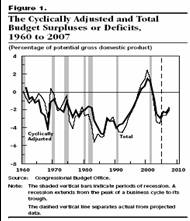The CBO’s latest estimates
It is reputed that President Bush asserted that the budget deficits occured because nobody ever planned for tax cuts, war and recession to occur simultaneously. To my knowledge, nobody has ever been able to verify this quote, although President Bush lays blame on the recession in this 2004 press conference (some two and half years after the recession’s end). But in any case, it is beside the point. The CBO has published its graph of the cyclically adjusted standardized budget balance. We are now long past the recession, yet the cyclically adjusted budget deficit remains large as a proportion of GDP, and is projected to start to shrink partly because of the “current law” assumptions CBO is required to incorporate by statute.

Source: CBO, The Cyclically Adjusted and Standardized
Budget Measures, March 2006.
So the President has a point. Instead of a swing of 6 percentage points of GDP from peak to trough in the budget balance — as implied by the unadjusted standardized budget balance — the full employment budget balance has shifted by only(!) about 4.5 percentage points. (Although, as outgoing CBO director Holtz-Eakin said, these are the “good ol’ days” as far as entitlements are concerned. Watch out for Medicare D!)
On a related note, CBO’s recently released An Analysis of the President’s Budgetary
Proposals for Fiscal Year 2007 (March 2006) has an interesting graph on page 3, showing that even with the Administration’s optimistic forecasts on spending cuts, the deficit begins to deteriorate again in FY 2011.
Technorati Tags: budget deficits,
cyclically adjusted budget balance,
tax cuts
The federal budget problems grow beyond belief after 2012 unless the social programs are torn apart.
Medicare and Medicaid costs will shock many inexperienced people who will be conducting budgetary analysis in six years.
I don’t know. In my view both Republicans and Democrats have a problem: they’re both longing for “things to return to normal” i.e. to the way things were in the mid to late 90’s. The problem with using this as a strategy is that the 90’s were an anomaly. Investment in technology over a protracted period (1983 to 2000) finally started paying off in the 90’s. There are lots of business magazine articles from the late 80’s and early 90’s complaining that all the investment in PC technology hadn’t paid off.
Well it did pay off and we’ve been reaping the benefits for the last ten years in the form of economic growth and productivity increases. But business is resting on its laurels; the level of investment hasn’t continued.
I don’t believe that 90’s-style economic growth is going to save the U. S. budget for either the Republicans or the Democrats. We’ll need to go back to the old-fashioned way of controlling the deficit through tax increases and/or real budget cuts. Or completely reorganizing our health care system, as Movie Guy points out, although I have no real hope of that taking place until after the disaster has already happened.
About that quote, then-OMB director Mitch Daniels claimed that Bush had said this in Oct. 2001:
Of course, Daniels was lying that Bush had listed those as reasons for running a deficit; Bush never said anything of the sort during the campaign. Nor did he say anything of the sort after the election, as he and his team were busy claiming that a recession was imminent (and Clinton’s fault) while pushing through tax cuts, which they refused to acknowledge could lead to deficits.
The campaign “trifecta” remark was apparently claimed (falsely, so far as I know) by Bush at
whitehouse.gov, May 2002 in his
“Remarks by the President at Taft for Governor Luncheon”
(link and discussion at spinsanity.org.) I don’t see that it’s very important, but the President did say that he’d said it.
So the President has a point. Instead of a swing of 6 percentage points of GDP from peak to trough in the budget balance as implied by the unadjusted standardized budget balance the full employment budget balance has shifted by only(!) about 4.5 percentage points. (Although, as outgoing CBO director Holtz-Eakin said, these are the good ol days as far as entitlements are concerned. Watch out for Medicare D!)